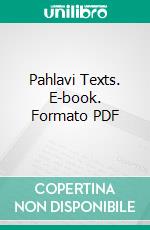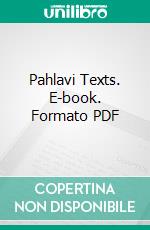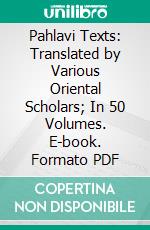Edward William West eBooks
eBooks di Edward William West di Formato Pdf
Pahlavi Texts. E-book. Formato PDF Edward William West - Forgotten Books, 2017 -
2. As the extent of Dk. VII is about Pahlavi words (without allowing for one folio lost), it probably contains about four-fifths of the details included in the Spend Nask, the Pahlavi version of which has been esti.
Pahlavi Texts. E-book. Formato PDF Edward William West - Forgotten Books, 2017 -
The peculiar mode of writing Pahlavi, here alluded to, long made the character of the language a standing puzzle for European scholars, and was first satisfactorily explained by Professor Haug, of Munich, in his admirable Essay on the Pahlavi Language already cited. Like the Assyrians of old, the Persians of Parthian times appear to have borrowed their writing from a foreign race.
Pahlavi Texts: Translated by Various Oriental Scholars; In 50 Volumes. E-book. Formato PDF Edward William West - Forgotten Books, 2017 -
1. The Dînâ-î Maînôg-î Khirad.The Pahlavi phrase Dînâ-î Maînôg-î Khirad, 'Opinions of the Spirit of Wisdom,' is a name applied to sixty-two enquiries, or series of enquiries, on subjects connected with the religion of the Mazda-worshippers, made by an anonymous wise man and answered by the Spirit of Wisdom. But, as this name is only found prefixed to a manuscript, written in A.D. 1569, in which the first part of the work is missing, it is doubtful whether it be the original name of the book, or not, although it is very suitable to the general character of the work.Regarding the reading of this name, here adopted, it must be observed that the correct pronunciation of the Pahlavi word maînôg, 'spirit,' is uncertain; the traditional reading is madonad, which is a possible pronunciation of its letters, but is otherwise inexplicable; Haug proposed to read maînivad or mînavad, but, in that case, the word ought to end with d=t, or with nd; some of the present Dasturs read mînoe, but this would be written mînoek in Pahlavi; the Pazand writers have mainyo, but this is evidently an imitation of Av. mainyavo, and does not correspond with the Pahlavi letters. As the word is manu or minô in the Sasanian inscriptions, and mînu in Persian, to which words a final k would be added in Pahlavi, it seems probable that the final letter of the Pahlavi word is not d or e, but g, a corruption of k, and that we ought to read mînog or maînog.


